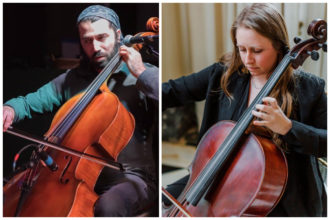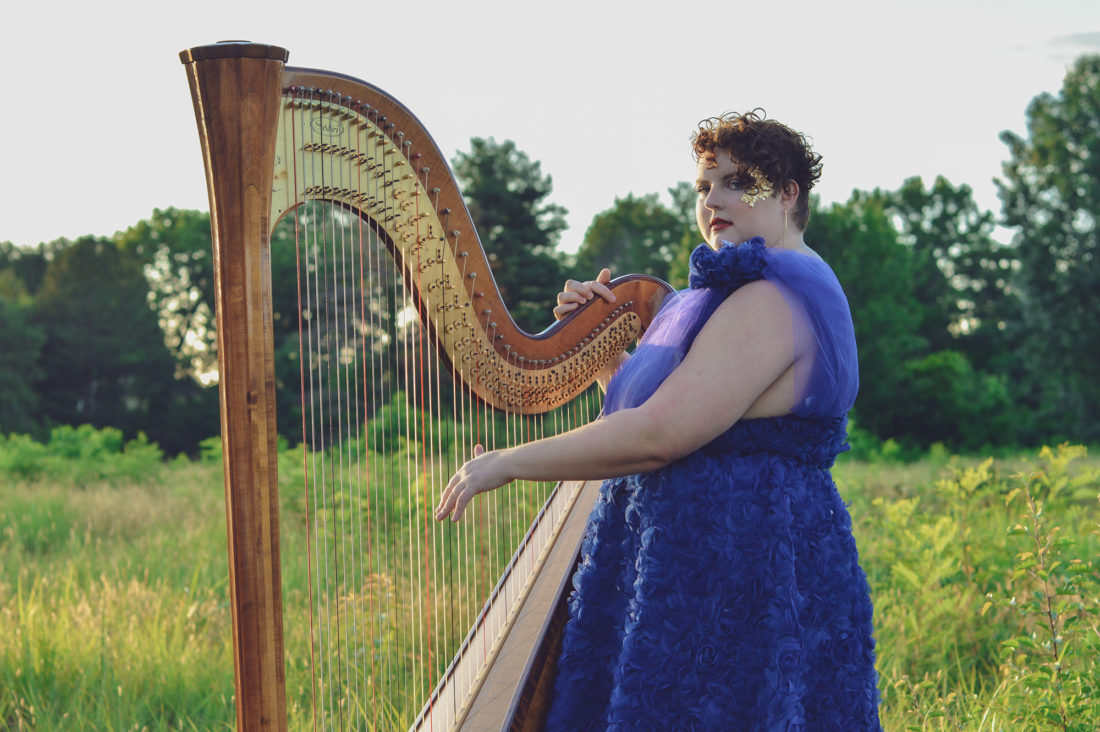Franklin Keel fondly remembers the moment when he devoted his life to music.
From a young age, the Asheville native loved listening to records but found practicing a chore, even after switching from violin to cello at the age of 6. However, his parents insisted that he take music lessons and practice until he got to a place in his life where he could make a more informed decision about whether or not to quit.
That moment arrived in high school when Keel discovered Antonio Vivaldi‘s Concerto for Four Violins in B Minor. From there, he took what he calls “a pretty deep dive into the music of Vivaldi and other baroque giants,” and made his way to Johann Sebastian Bach’s six Cello Suites. Through this exploration, Keel spent hours each day with his instrument, and his interest was further piqued by friends and relatives giving him CDs and sheet music as Christmas and birthday gifts.
He then joined the Asheville Symphony Youth Orchestra and met his teacher, Ron Clearfield, who helped him get into the prestigious Brevard Music Center the following summer. There, Keel performed his first full-length symphony, Pyotr Ilyich Tchaikovsky’s Symphony No. 4.
“At the end of that performance, we all stood to receive the audience applause, and I made my decision then and there that this was a career move,” Keel says.
For many artists like Keel, pursuing classical music professionally often means moving to a larger metropolitan area. But in Keel’s case, he wanted to stay in Western North Carolina. To make it work, he had to cobble together a career that embraced opportunities beyond a full-time orchestra gig.
Twenty-six years later, the decision is panning out. Today, Keel is the associate principal cello with the Asheville Symphony. To supplement his income, he also teaches music and plays in a number of rock bands.
Keel says what he and other classically trained musicians have discovered is that Asheville is an ideal location for creatives open to a multifaceted approach.
“All the ingredients are here,” he explains. “And they have enabled me to cover a vast amount of music over the years.”
The mother of invention
Amanda Durst, cellist for the Blue Ridge Orchestra volunteer ensemble, echoes Keel’s observations.
“There is no full-time orchestra around here,” she says. This reality, Durst adds, is not unique to WNC. But what separates the region from other places, she continues, is the number of opportunities for other types of creative collaborations.
A native of Maryland, Durst moved to Asheville in 2018 after playing with various ensembles in the Washington and Baltimore areas. Growing up, Durst studied recorder and piano and enjoyed what she calls “a really robust string program” in her elementary school. She switched from violin to cello at age 10, and in high school started taking private lessons. Around this time, she also joined a local community orchestra and a youth orchestra.
“I saw my friends going off to college, and a lot of them were pursuing music education degrees,” she says. “It was then that I was like, ‘Oh, I guess people can do this as a career. That’s what I want to do’ — even though I had really no idea kind of what that entailed. I just knew that I loved playing cello and wanted to keep doing it.”
At St. Mary’s College of Maryland, Durst logged significant hours performing orchestral and chamber music as well as playing out in the community. But she also gained plentiful arts administration experience working for the school’s summer classical music festival, where she got a behind-the-scenes understanding of the industry. This insight, she notes, led to her efforts in breaking down barriers within her field.

“I was able to learn more about how to make the arts more accessible to people and also how to support organizations who are doing work to make arts accessible,” Durst says. “It never felt like it had to be an either-or thing. It’s been a thing that, throughout the course of my career, has grown in tandem and the two things have supported each other, which has been really cool.”
Locally, Durst puts those passions into practice as the assistant director of MusicWorks! Asheville, an after-school music program based at Leicester Elementary School. The program is rooted in teaching life skills through music and prioritizing low-income kids who otherwise wouldn’t have access to the arts.
Durst says giving a new generation of youths those opportunities is “near and dear to my heart.” And Keel feels a similar motivation in his classroom work, teaching string orchestra courses at Asheville Middle School, Asheville High School and the School of Inquiry and Life Sciences at Asheville.
“Teaching helps me stay grounded in the basics. I also need to keep my technique in good condition,” he says. “And it fulfills what feels like a karmic duty to pass on the gifts that were given to me in the arena where I found my passion.”
All the world’s a stage
These professionals agree, however, that this burning desire for music must be stoked by regular practice and performance. And few local musicians ascribe to this notion more thoroughly than Keel, who, in addition to his role with the Asheville Symphony, is a member of the chamber music group Opal String Quartet and plays electric cello in rock bands Sirius.B and Upland Drive, each of which appeals to different sides of his creativity.
“Symphonic and chamber music represents some of the most beautiful literature ever written, but it’s all by people who existed in a different time, place and culture,” Keel says. “Rock music and session work allow me to immerse myself in the music that is actively being created now in our time, our place and our culture. It’s based on our ideas and our lives’ experiences. Who knows? Maybe our music will be played in concert halls in 250 years.”
During the orchestra season, which typically runs September-May, Durst will travel within a 50-mile radius of Asheville to play with “any orchestra that will have me.” But by season’s end, she stays busy playing for weddings, as does her friend and fellow Blue Ridge Orchestra member Tori Parrish.
A harpist since the age of 6, Parrish (who uses they/them pronouns) began performing at nuptials by 16. Classically trained at Stanford University, they later played at various tech company events in Silicon Valley. Burned out by the demands of orchestral life, the Cary native later shifted to modern impressionist painting. But over time, the harp beckoned, and they gradually discovered a renewed interest in their instrument via composing and arranging custom pieces for couples’ wedding days.
To kick off that process, Parrish holds a 15-minute call with prospective clients, asking them questions about the couple’s shared interests, as well as the ceremony and its vibe. Parrish then gets to work, eventually performing a preview of her set for the couple’s approval. The harpist notes that the results, which creatively weave in memorable melodies from the pair’s relationship, often elicit tears of happiness.
“I like to do a little digging on that first call and then take whatever the essence is of the things that they love to watch and the things they like to consume that they might not necessarily think would lend themselves to a wedding — or might sound weird or be cheesy — but finding a way to make it beautiful and flow with the rest of the wedding,” Parrish says.
These assignments provide Parrish’s main source of income and introduce the gregarious artist to a steady stream of “really cool couples” to bond with. In turn, they’ve also fallen back in love with playing harp and have found a new kind of joy playing with the Blue Ridge Orchestra.
“I love it, actually,” Parrish says. “So now I’m like, ‘OK, maybe I’ll play some more orchestras. This is actually kind of fun.’”






Before you comment
The comments section is here to provide a platform for civil dialogue on the issues we face together as a local community. Xpress is committed to offering this platform for all voices, but when the tone of the discussion gets nasty or strays off topic, we believe many people choose not to participate. Xpress editors are determined to moderate comments to ensure a constructive interchange is maintained. All comments judged not to be in keeping with the spirit of civil discourse will be removed and repeat violators will be banned. See here for our terms of service. Thank you for being part of this effort to promote respectful discussion.